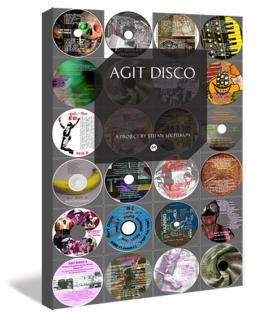Agit Disco collects the playlists of its 23 writers to tell the story of how music has politically influenced and inspired them. The book provides a multi-genre survey of political musics, from a wide range of viewpoints, that goes beyond protest songs into the darker hinterlands of musical meaning. Each playlist is annotated and illustrated. The collection grew organically with an exchange of homemade CDs and images. These images, with their DIY graphics, are used to give the playlists a visual materiality.
Almost everyone makes selections of music to play to themselves and friends. Agit Disco intends to show the importance of this creative activity and its place in our formation as political beings. This activity is at odds with to the usual process of selection by the mainstream media - in which the most potent musical agents of change are, whenever possible, erased from the public airwaves.
Agit Disco Selectors: Sian Addicott, Louise Carolin, Peter Conlin, Mel Croucher, Martin Dixon, John Eden, Sarah Falloon, Simon Ford, Peter Haining, Stewart Home, Tom Jennings, DJ Krautpleaser, Roger McKinley, Micheline Mason, Tracey Moberly, Luca Paci, Room 13 – Lochyside Scotland, Howard Slater, Johnny Spencer, Stefan Szczelkun, Andy T, Neil Transpontine, Tom Vague
ISBN 978-1-906496-51-7
Date of Publication: 1/2012
Reviews
Quotes from Jim Donaghey, (2012): Review in Anarchist Studies 20.2 p.126
Agit Disco encourages an exploration of genres we might otherwise be unfamiliar with , and helps to draw out the interweaving currents of influence across politically engaged musics.
Agit Disco is highly effective in sparking a reconsideration of the reader's or listener's experience of music and politics, and this book element of the wider project will surely encourage others to begin their own dialogues, and contribute to those million compilation CDs that Szczelkun hopes for.
Quotes from Mat Callahan (2012): Agit Disco, Socialism and Democracy, 26:3, pp212-217
The music industry long ago made pop music journalism an extension of its dominance over music production, distribution and consumption. Agit Disco has the great virtue of enabling informed discussion of music by people who clearly cherish the music they are discussing. The value of music, therefore, is of a different order of magnitude than that of a disposable unit manufactured for financial gain. What comes across is a love and respect for music, a celebration of music's timeless role in the life of communities and in their resistance to oppression.
An outstanding feature of this book is the broad range of artists, styles and eras, its inclusiveness exemplifying the archival framework on which the project rests. Through the choices made and the reasons given for making them, social history is told.
While openly declaring that they are not trying to be encyclopaedic […] the editors have assembled ample data to disprove the claims of the music industry mouthpieces that what the masses really want is entertainment.
Agit Disco performs a service that is sorely needed since it simultaneously celebrates the community-forming function of music while demonstrating the universality of this function for all oppressed people.
The Task Agit Disco sets out to accomplish, therefore, bears a superficial resemblance to both cultural studies and pop music journalism while on a more profound level making a critique of both. That this critique comes in the form of a praxis as opposed to a conventional polemic is actually part of the critique - targeting self-proclaimed or institutionally sanctioned 'experts' who in addition to passing judgement on what is good music and its proper relationship with politics, rule out the intelligence and creativity of working-class and other supposedly less qualified people.
Quotes from anon (2012) Neural: The Illegal Issue Issue 42 p.19 (Italy)
It's a brilliant idea, defining in a limited space (the CD, a medium that can circulate, but with very little amount of storable music compared to any current mp3 reader) a personal political path, finding unreliable connections within the track list, but still reflecting the connection between popular music and working class politics. The combination of the slow reading on paper and the listening establishes a strong base for collective awareness and political discourse.
Quotes from Phil England (2012) The Wire, April 2012, p.75
Szczelkun is helping create a dynamic alternative understanding of what might constitute political music from the ground up.
The personal selections inside, directly or indirectly, prompt all kinds of questions, reanimating them as a living dialogue in the present.
Ekin Sanac 'Music and Agitation' interview with Stefan Szczelkun and Anthony Iles published in BANTmag February 2012 (Turkey) http://www.bantmag.com/mag/04/page/view/448
Also see Blog reviews by Simon Poulter and Duncan Reekie: http://www.viralprojects.com/?p=677 http://www.academia.edu/1418265/The_Book_of_the_Song









